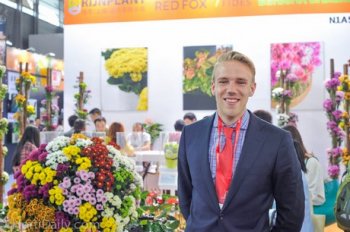
This offers opportunities for suppliers of cuttings, like Agribio China, now called Dümmen Orange. "Our sales increased drastically over the last years. Currently, we sell 15 million cuttings to Chinese growers. Next year, these sales could increase by another 30%," said Jim Koop, Commercial Manager at Dümmen Orange at the HortiFloraexpo IPM in Shanghai, China.
Three years ago, Koop started to sell cuttings in China. Over the years, he noticed large changes regarding flower consumption there. "The demand for flowers increased and especially the so-called family consumption," he said. "The population of the middle class has increased and people have more money to spend on flowers. Additionally, more flowers are displayed in public places, like banks."
The increasing demand for flowers offers new possibilities for local growers. "The Chinese flower growers are expanding year after year. However, quality is still an issue over here", Koop said. Many flowers are still cultivated from illegal cuttings, which consequently lower the prices of flowers on the market. Koop took the Kalanchoe as an example to illustrate the problem. "Approximately 50% of the kalanchoes produced in China are of low quality. They are cultivated from low-cost illegal cuttings with low quality substrates. These plants are available on the market for USD $0.15-0.20, while high quality kalanchoes can be sold for thrice as much. Consequently, these low prices affect the prices of the high quality kalanchoes."
Fortunately, Chinese consumers are becoming increasingly more aware of the quality of flowers. This became clear at the HortiFloraexpo in Shanghai. "Many florists who visited our stand had a lot of knowledge about different species and the quality standards of these species," Koop said and suggested this development opens up a new market for Dümmen Orange in China. "In Europe, we already have connections with florists. In China, however, these contacts need to be established."
Author: Elita Vellekoop, www.floraldaily.com



 Classifieds
Classifieds



